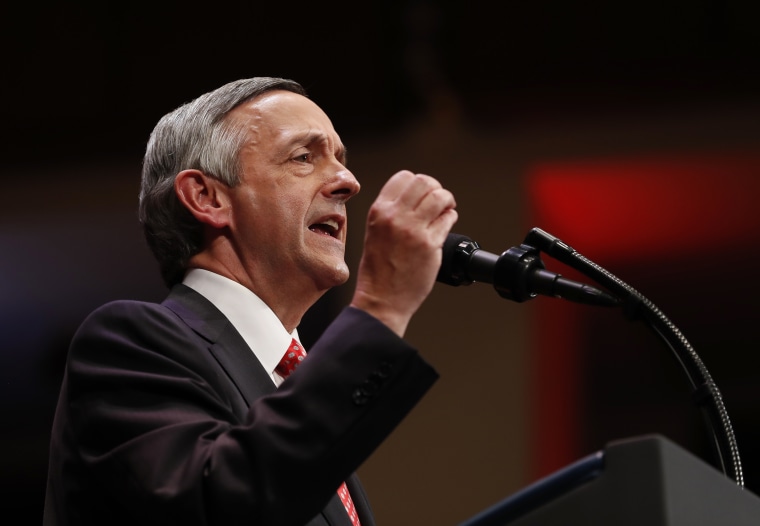First up from the God Machine this week is a look at the kind of defense Donald Trump's evangelical Christian allies are offering in the wake of the president's Stormy Daniels scandal.
Helping lead the defense is far-right megachurch leader Robert Jeffress -- a familiar name to regular readers -- who first rose to national political prominence during the 2012 presidential campaign, when he partnered with then-Texas Gov. Rick Perry's (R) candidacy and attacked Mitt Romney as "a member of a cult."
Much of the country soon became acquainted with the Texan's record of over-the-top extremism, including his description of Roman Catholicism as a "cult-like pagan religion," which represents "the genius of Satan."
Former New Jersey Gov. Chris Christie (R) said to associate with Robert Jeffress was "beneath the office of president of the United States."
Donald Trump, however, has embraced Jeffress as a close ally, and the megachurch pastor has returned the favor.
"Evangelicals still believe in the commandment: Thou shalt not have sex with a porn star," Robert Jeffress told Fox News on Thursday. "However, whether this president violated that commandment or not is totally irrelevant to our support of him."Jeffress, who is an evangelical adviser to the president, said Trump's personal behavior isn't an issue. "Evangelicals knew they weren't voting for an altar boy when they voted for Donald Trump," he said.
Let's pause to note that anytime a prominent Christian evangelist begins an argument by saying, "Evangelicals still believe in the commandment: Thou shalt not have sex with a porn star. However..." the sentence probably won't end well.
Nevertheless, in the same interview, Jeffress emphasized his bond with his ally in the White House. "I'm his friend," he said. "I will never walk away."
This is not an uncommon sentiment among Christian conservatives. In January, Family Research Council President Tony Perkins said the religious right and the movement's adherents agree that Trump should "get a mulligan" when it comes to his personal misdeeds.
Part of the challenge here is the transparent hypocrisy. A decade ago, as Right Wing Watch noted this week, Jeffress specifically condemned any effort to put aside religious principles for the sake of political convenience.
"Christians need to remember that the kingdom of God is not going to come riding in on Air Force One," Jeffress said. "The danger in all of this discussion is that Christians sometimes are willing to sacrifice the temporal for the eternal, that in order to get their candidate elected, to enact those laws that they feel are crucial, somehow we fool ourselves into thinking we are going to bring about the kingdom of God here on Earth. We are not going to do that. I'm not willing to trade people's eternal destiny for some temporary change in the law."
His perspective, evidently, has changed.
But it's the result of the change that's worth appreciating. As we discussed after Perkins' "mulligan" comments, many Christian conservatives appear to have discovered the virtues of moral relativism.
Trump has high-profile allies in the religious right who've effectively made a moral calculus, borne of political objectives: so long as their partisan ally in the White House delivers on social conservatives' goals, the religious right is prepared to lower the bar on their stated principles.
The movement, or at least the 2018 version of it, has its priorities, and championing the highest moral standards isn’t necessarily one of them. As the Washington Post’s Michael Gerson put it a while back, “The level of cynicism here is startling. Some Christian leaders are surrendering the idea that character matters in public life in direct exchange for political benefits to Christians themselves. It is a political maneuver indistinguishable from those performed by business or union lobbyists every day. Only seedier. You scratch my back, I’ll wink at dehumanization and Stormy Daniels. The gag reflex is entirely gone.”
Following his “mulligan” comments, Perkins was rather explicit in endorsing the virtues of the religious right’s dubious deal. “This isn’t blind allegiance [to the president] on the part of evangelicals,” Perkins said. “This is reasoned support for a political leader who has made and kept his campaign promises.”
But as we talked about at the time, that only reinforces the underlying point. Moral assessments, in this case, are conditional. So long as politically conservative evangelicals are satisfied with Trump’s politics, his allied Christians are prepared to turn a blind eye to Trump’s morals. His failings are, in a purely practical sense, less relevant than the religious right’s broader wish-list.
What’s less clear is whether evangelical Christianity in the United States will ever be the same.
Michael Steele, the former Republican National Committee chairman, shared his personal message to the religious right on MSNBC’s “Hardball” in January: “Just shut the hell up and don’t ever preach to me about anything ever again. I don’t want to hear it.... After telling me how to live my life, who to love, what to believe, what not to believe, what to do and what not to do and now you sit back and the prostitutes don’t matter? The grabbing the you-know-what doesn’t matter? The outright behavior and lies don’t matter? Just shut up.”
